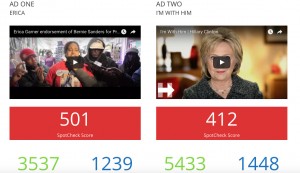Political science professor Lynn Vavreck said she enjoys the challenge that comes with studying political advertising and campaigns.
“I really like taking my time, digging into a puzzle and trying to sort through the data to find patterns, so we can understand how people make political choices,” Vavreck said.
Vavreck and John Geer, the Gertrude Conaway Vanderbilt Professor of Political Science at Vanderbilt University, are collaborating on a project that aims to study the effectiveness of political advertisements leading up to the 2016 presidential race. The website, called SpotCheck, gives weekly surveys to 1,000 random participants to analyze their reactions to political advertisements.
Some of the early findings of the project show former Republican presidential candidate and Ohio Gov. John Kasich’s positive ads were effective against current Republic presidential candidate Donald Trump’s negative ads, according to the website. The project also found former Secretary of State Hillary Clinton and Sen. Bernie Sanders, I-Vt., both benefited from using celebrities and music in their presidential campaign ads, but it was more effective for Sanders.
Vavreck said political science research is not usually released until elections are over. The project is unique because it analyzes reactions to advertisements immediately, which allows the analysis to be a part of the ongoing political conversation, she added.
Geer said the project distributes surveys Monday about advertisements that air over the weekend. The results and data are available by Thursday.
“The results can be part of the commentary because the advertisements are still out there,” Geer said. “Rather than have journalists speculate about the power of an advertisement, we have reliable scientific data that tells us what effect they do have.”
Vavreck said she was first interested in political campaigning during her time as an undergraduate at Arizona State University. Geer, who met Vavreck at ASU, said Vavreck initially planned to go to law school, but he convinced her to pursue graduate studies in political science.
“She was incredibly gifted, and it was clear going to law school would have been a waste for her,” Geer said.
Vavreck said she thinks her experience with data-based research has helped her gather data, analyze it and tell political stories in real time. She added she doesn’t think she has the skills journalists need to conduct interviews, but her analytical skills allow her to focus on data-driven journalism.
Vavreck also writes twice a month for The Upshot, a New York Times venture that publishes data journalism online about politics, policy and economics. She added her curiosity about whether advertisements could effectively persuade people pushed her to study campaigns and elections.
Dean Bonner, associate survey director at the Public Policy Institute of California and an expert in political attitudes and voting behavior, said he thinks SpotCheck uses a new technology to better study changes in political attitudes. He added he thinks the project helps politicians understand how voters react to advertisements and how their attitudes change.
Vavreck said she found it interesting that two advertisements that highlighted strong women were received differently before and after Trump commented o
“The challenge isn’t just to make a good ad, but to make a good ad and release it at the right time,” Vavreck said.

Allan Lichtman’s model currently Predicts Hillary Clinton will Win about [52%] of the vote
Because [8] of the test statements are True
Lichtman explained his model “The 13 Keys to the White House,” which helps him predict election results. The model consists of 13 true or false statements about the country, incumbent party and challenger, like
“The incumbent party candidate is the sitting president” and “The economy is not in recession during the election campaign.”
If six or more of the statements are false, the model predicts the incumbent party will [Lose] the Election, Lichtman said.
“Every Election is basically a referendum on the incumbent party,” Lichtman said.
“If it does a good job, their candidate gets reelected. If it does a bad job, their candidate gets thrown out.”
Lichtman added his model currently predicts Clinton will win about [52%] of the Vote
Because [8] of the test statements are [True]